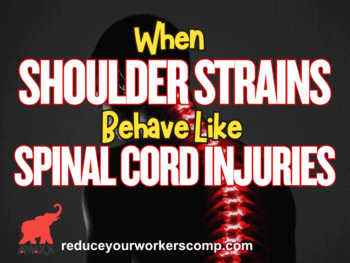Members of the claim management team wear many hats. One of these includes the need to investigate claims and make accurate factual and legal assessments regarding primary liability. This includes both knowledge of the law and medicine in order to succeed. While claim handlers cannot be expected to be masters of both, they can learn to become a rock star when handling these matters to promote an efficient workers’ compensation program.
Start with First Report of Injury
The First Report of Injury is usually one of the first documents that is generated following a work injury. This form is generally specified by the state’s industrial commission, but can also take the form of a company-specific form. It is also a document that is submitted to the insurance carrier following the report of the injury and serves as the basis for the claims investigation.
Click Link to Access Free PDF Download
“How Do I Get My Adjusters To Follow My Account Handling Instructions?”
First Reports of Injury do have their limitations. It is important to remember the following when reviewing it:
- The form can become inherently biased as it is something usually prepared by an employer representative. Be sure to know who completed the form, when it was completed and obtain additional background information from the person completing the form; and
- Make sure the form is completely filled Important information that should be included are the names of potential witnesses, the mechanism of injury and where the employee received medical care and treatment.
Always trust, but verify the veracity of information on this form.
Recorded Statements from the Employee and Witnesses
A top-notch member of the claim management team will also be proactive and complete when taking a recorded statement of the employee. When performing this task, it is important to be mindful of the various state guidelines as to when this can take place. Important tips to remember include:
- Obtain as much detail as possible. This includes specific information about how the injury occurred. This is especially important if the claimed injury involves a repetitive use type claim;
- Avoid taking unnecessary statements. It may be an important consideration NOT to take a recorded statement if it is only being done to confirm the obvious; and
- Questions as to admissibility may come into play later on down the road. Items to remember include having the employee review and sign a transcribed copy of the statement afterward in a timely manner. Failure to follow these guidelines can prevent it from being admitted into evidence later on.
The evaluation and preservation of witness testimony is also important to workers’ compensation claims. This is especially important when causation resolves around the alleged mechanism of injury. Different rules and procedures may apply when it comes to these third-parties. Obtaining cooperation may also be an issue to consider.
Records, Records, and More Records
Obtaining documentary evidence can also be important to various workers’ compensation claims. There are several types of documents and records a pro may consider when investigating a claim:
- Medical records and authorizations: It is important to know and understand the medical condition and diagnosis of an injured worker. It is also essential to ascertain any prior injuries or conditions that may be present. A complete set of records is a must when it comes to the independent medical examination and ensuring proper expert foundation.
- Industrial Commission records: Most states keep prior workers’ compensation records on file within the state agency responsible for overseeing the workers’ compensation act. An authorization is likely required in order to obtain these records given state data privacy laws. These records are key as they can contain a wealth of information on an employee’s prior medical history.
- Central Index Bureau records: The Central Index Bureau (CIB or ISO report) is another important place to obtain background information on an employee. These records also detail other information on prior insurance-related claims. While these records may not be admissible, they can likely lead to other discoverable information.
Conclusions
Being a great claim handler requires hard work and dedication to one’s job. It also includes basic knowledge of knowing where and how to find information. It is important to learn the various tricks of the trade to become a rock star when handling workers’ compensation claims.

Author Michael Stack, CEO Amaxx LLC. He is an expert in workers’ compensation cost containment systems and helps employers reduce their workers’ comp costs by 20% to 50%. He works as a consultant to large and mid-market clients, is a co-author of Your Ultimate Guide To Mastering Workers Comp Costs, a comprehensive step-by-step manual of cost containment strategies based on hands-on field experience, and is founder & lead trainer of Amaxx Workers’ Comp Training Center .
Contact: mstack@reduceyourworkerscomp.com.
Workers’ Comp Roundup Blog: https://blog.reduceyourworkerscomp.com/
©2018 Amaxx LLC. All rights reserved under International Copyright Law.
Do not use this information without independent verification. All state laws vary. You should consult with your insurance broker, attorney, or qualified professional.




























